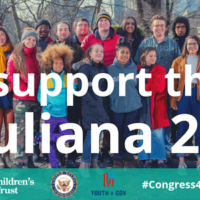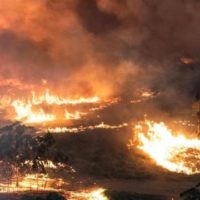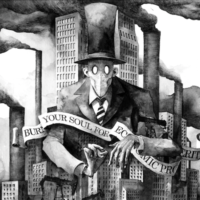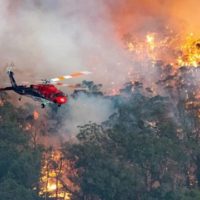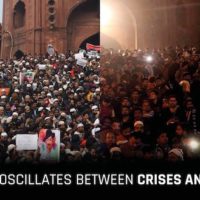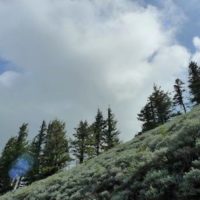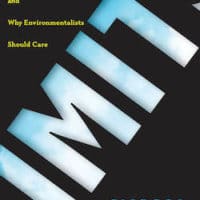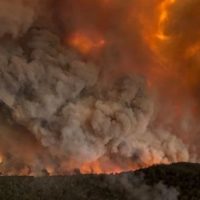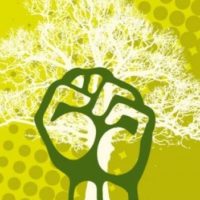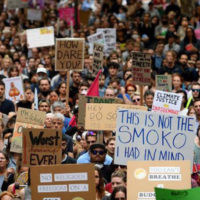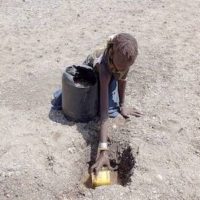-
Closer than ever: It is 100 seconds to midnight
Humanity continues to face two simultaneous existential dangers—nuclear war and climate change—that are compounded by a threat multiplier, cyber-enabled information warfare, that undercuts society’s ability to respond.
-
The Juliana 21 continue to fight for justice in the biggest climate lawsuit in America
Decision of Divided Ninth Circuit Court of Appeals finds primarily for Juliana plaintiffs, but holds Federal Judiciary can do nothing to stop the U.S. Government in causing climate change and harming children.
-
The climate-migration-industrial complex
Thirty years ago there were fifteen border walls around the world. Now there are seventy walls and over one billion national and international migrants. International migrants alone may even double in the next forty years due to global warming.
-
Jeff Bezos donates three minutes’ income to help Australia fight wildfires
The donation would be equivalent to someone who earned $500 per week announcing on social media that they had just donated five cents to help tackle the blazes.
-
Australia’s profit-driven apocalypse
Some firefighters report flames 150 metres high. Read that again, slowly. Flames 150 metres high. Higher than a 40 storey building.
-
Misrepresenting Marx’s Ecology: A Response to Daniel Tanuro’s “Was Marx an Ecosocialist?”
Daniel Tanuro is an agricultural engineer and leading socialist activist who has made numerous contributions to ecosocialist thought and practice, most notably, in his book Green Capitalism: Why It Can’t Work. Yet, this has been coupled with persistent claims that there are “fundamental flaws” in Karl Marx’s ecological critique of capitalism.
-
How getting rid of ‘shit jobs’ and the metric of productivity can combat climate change
Yes, we’ll be less efficient. But we’ll be happier, more useful and better able to tackle climate change.
-
The limits of capitalism
At this point in human history, the limits of capitalism and the limits of our species’ life on Earth have converged. We have never been here before, and we cannot go back.
-
Climate scientist: I witnessed Australia on fire. Climate change is already here.
Prior to beginning my sabbatical stay in Sydney, I took the opportunity this holiday season to vacation in Australia with my family. We went to see the Great Barrier Reef—one of the great wonders of this planet—while we still can. Subject to the twin assaults of warming-caused bleaching and ocean acidification, it will be gone in a matter of decades in the absence of a dramatic reduction in global carbon emissions.
-
President Thomas Sankara: A 70th birthday tribute
Thomas Sankara’s passion was Africa’s advancement; his experimental field was Burkina Faso. What President Sankara wanted to see in Africa, he strategized, mobilized and implemented in Burkina Faso. He would then present his successes to African leaders, while encouraging them to surpass his achievements.
-
What passes for reality is not worth respecting
In October of last year, the International Monetary Fund (IMF) released its flagship World Economic Outlook. In that report, the IMF said that the global growth rate would stumble at 3% in 2019. A month ago, the IMF’s main economists returned to this theme; ‘Global growth’, they wrote, ‘recorded its weakest pace since the global financial crisis a decade ago’.
-
Love the land or watch it die
Sagebrush, Ponderosa Pine, Juniper Trees, and Piñón Pine are important flora in the western United States. Juniper can live more than 1,000 years, as can some Piñón. Ponderosa live up to 400 years. Sagebrush is a perennial and can survive for 100 years. All have been and are used for a variety of purposes by native peoples.
-
Is degrowth an alternative to capitalism?
In what follows, I will first briefly summarize the core arguments of the book, which promises to provoke important discussions on the matter of limits and subjects. Then I will reflect on the fuzziness of the primarily cultural conceptualization of capitalism, and argue that neither self-limitation nor degrowth qualifies as a mode of production, such that they could constitute an alternative to capitalism.
-
Ruling class bereft of answers while catastrophic fires escalate across Australia
New fires are expected to ignite, while strong winds are predicted to fan the hundreds of blazes that are already burning. Hundreds of thousands of people were urged yesterday to evacuate the most-at-risk areas.
-
A culture of reconciliation with nature
Christopher Caudwell, who died at age 29 fighting with the International Brigades in the Spanish Civil War, wrote: “Either the devil has come amongst us having great power, or there is a causal explanation for a disease common to economics, science, and art.” That disease, he recognized, was the self-alienation of humanity under capitalism
-
Ecological Revolution
John Foster gives a radio interview on Ecological Revolution
-
‘No one is coming to save us, except us’ – Sydney demands action on the environment
In the face of climate crisis megafires and an air quality health crisis, 40,000 people rallied and marched in Sydney to demand action on Wednesday night. The city is choking, and New South Wales is on fire. In Randwick on Tuesday, the air pollution was 11 times higher than “hazardous”.
-
How the rich plan to rule a burning planet
The climate crisis isn’t a future we must fight to avoid. It’s an already unfolding reality. It’s the intensification of extreme weather–cyclones, storms and floods, droughts and deadly heat waves.
-
The growing threat of water wars
In 2015, United Nations member states adopted the Sustainable Development Goals, which include an imperative to “ensure availability and sustainable management of water and sanitation for all.” Yet, in the last four years, matters have deteriorated significantly.
-
Geoengineering is no climate fix. But calling it a moral hazard could be counterproductive
Desperate times call for desperate measures. In recent years and in the face of unprecedented changes in the climate system, some previously unknown and risky solutions have been proposed to put a halt to the chain of climate disasters, or at least to slow down the speed of their onslaught.


